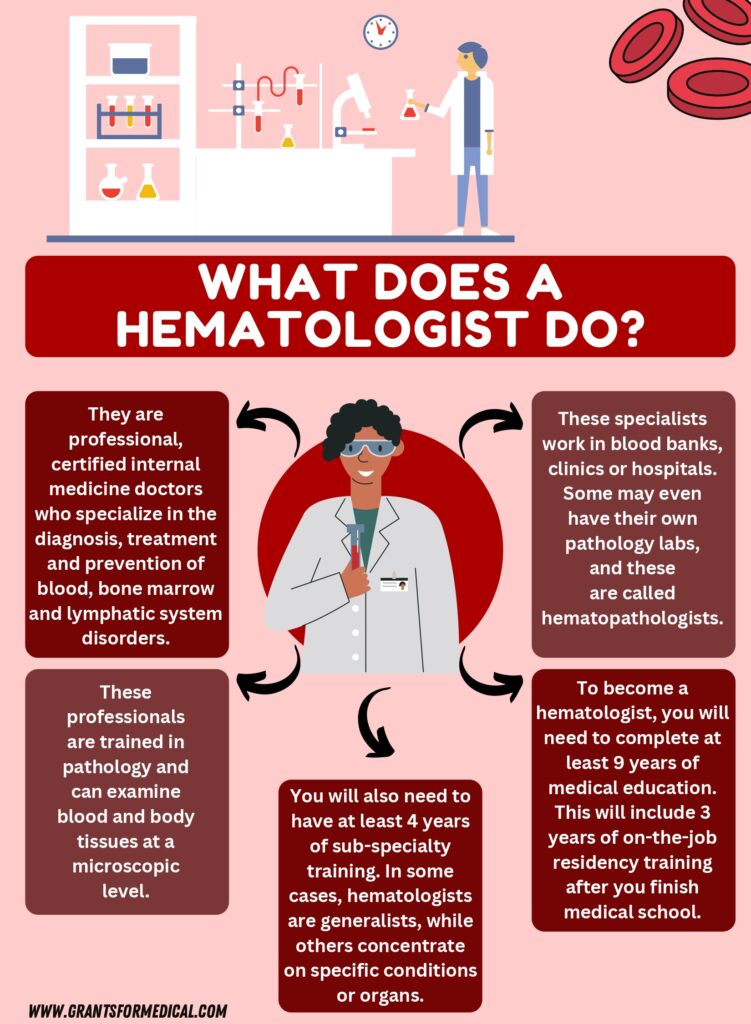What is Hematology
Hematology is the study of blood and blood-borne diseases. Hematology includes the treatment of blood malignancies and disorders.
These disorders include blood clots, hemophilia, lymphoma, leukemia, sickle-cell anemia and myeloma.
Hematology is a branch of internal medicine that deals with the pathology, physiology, diagnosis, etiology, treatment, prevention and prognosis of blood-related ailments.
Hematologists are trained in the bone marrow and lymphatic systems and can also diagnose platelet and blood irregularities.
As a hematologist, you will be responsible for treating organs in the body that are fed by blood cells, which include the spleen, lymphoid tissue, thymus and lymph nodes.
What are some common blood disorders?
Some common blood disorders include anemia, hemophilia, leukemia, lymphoma, myeloma, sickle cell disease, thalassemia, and von Willebrand disease. These disorders can affect the production, function or quality of blood cells.
What are the symptoms of blood disorders?
The symptoms of blood disorders vary depending on the type and severity of the disorder. Some general symptoms may include fatigue, weakness, bruising, bleeding, infections, fever, pain, swelling, or weight loss.
How are blood disorders diagnosed?
Blood disorders are diagnosed by performing various tests on blood samples. These tests may include complete blood count (CBC), blood smear, coagulation tests, bone marrow biopsy, genetic tests, or immunological tests.
How are blood disorders treated?
The treatment of blood disorders depends on the cause and type of the disorder. Some common treatments include blood transfusions, medications, chemotherapy, radiation therapy, stem cell transplantation, or gene therapy.
What are some preventive measures for blood disorders?
Some preventive measures for blood disorders include maintaining a healthy lifestyle, avoiding exposure to toxins or infections, getting regular check-ups and screenings, following prescribed treatments, and taking supplements if needed.
Areas of Study Under Hematology
There are four main areas of focus under hematology: hematologic malignancies, hemoglobinopathy, coagulopathy and anemia.
Hemoglobinopathy studies abnormalities in the globin chains of the hemoglobin molecules. Apart from sickle-cell anemia, thalassemia is also studied under hemoglobinopathy.
Hematologic malignancies relate to diagnosing and treating cancers of the lymph nodes, blood and bone marrow.
Myeloma is a form of hematologic malignancy similar to lymphoma and leukemia.
Besides these, hematology also relates to studying deep-vein thrombosis, arterial thromboembolism and neutropenia.
Hematologists also often work in oncology. Hematologists need to team up with oncologists to care for children and adults suffering from blood or bone marrow cancer, including lymphoma and leukemia.
Hematology also includes blood tests, such as CBC (complete blood count). This test is usually part of a routine health exam.
It is required to diagnose the presence of blood clotting issues, anemia, blood cancers and disorders and infections affecting the immune system.
What is a Hematologist
Hematologists are professional, certified internal medicine doctors who specialize in the diagnosis, treatment and prevention of blood, bone marrow and lymphatic system disorders.
These specialists work in blood banks, clinics or hospitals. Some may even have their pathology labs, and these are called hematopathologists.
These professionals are trained in pathology and can examine blood and body tissues at a microscopic level.
To become a hematologist, the typical path involves completing 4 years of medical school followed by a residency in internal medicine, which usually lasts 3 years, and then a fellowship in hematology, which generally lasts 2-3 years.
You will also need to have at least four years of subspecialty training. Hematologists are sometimes generalists, while others concentrate on specific conditions or organs.
What Does a Hematologist Do

A primary care physician usually refers a hematologist. Some of the more common reasons for being referred to a hematologist include:
- Blood clots (deep vein thrombosis)
- Anemia (low red blood cell count)
- Sepsis (extreme reaction to infection)
- Lymphoma, leukemia or multiple myeloma (cancer of white blood cells, lymph nodes or bone marrow)
- Hemophilia (genetic blood clotting disorder)
- Sickle cell disease (faulty red blood cells)
As a hematologist, you must also perform different tests and procedures. This usually includes diagnosing through blood testing and even treatment through blood transfusions.
Hematologists commonly perform a complete blood count (CBC) test. This test is crucial to detect and diagnose various types of diseases.
This test includes testing the level of platelets and all three types of blood cells. Blood transfusion involves replacing blood lost in surgery, illness or accident.
More advanced hematologists are also involved in bone marrow transplants, where the damaged stem cells in the marrow of your bones are replaced with healthy blood cells from other parts of your body.
Conclusion
Hematology is the study of blood-borne diseases and disorders. Numerous health problems affect the blood directly, from cancers to anemia.
Hematologists provide a wide variety of clinical tests and medical treatments.
There is a huge scope for a career in hematology, thanks to the integration of internal medicine into most other medical fields.
See Also
CBT Training for Family Physicians
What is the Success Rate of IVF